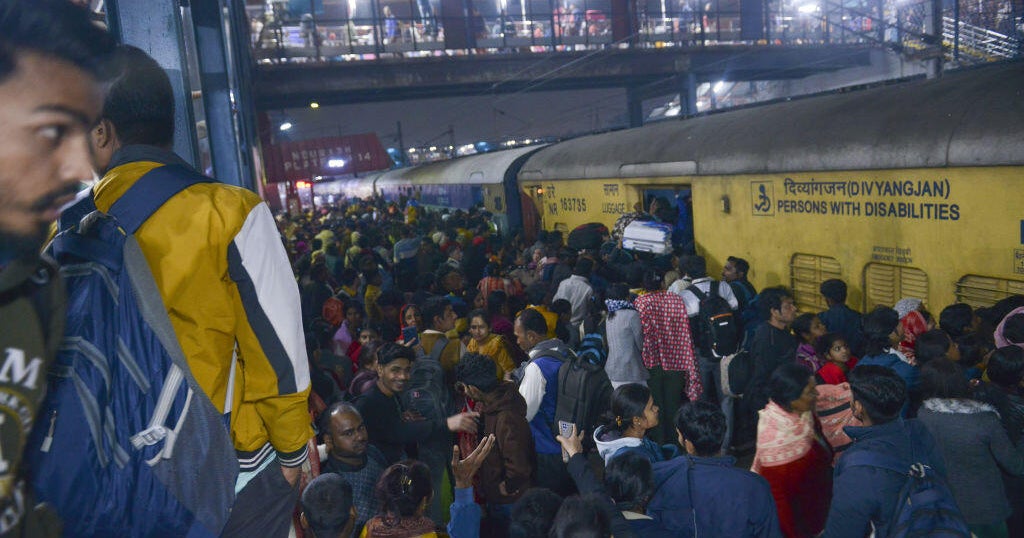Pulitzer-winning journalists jailed for reporting on Rohingyas freed in Myanmar
Yangon, Myanmar -- Two Reuters journalists who were imprisoned for breaking Myanmar's Official Secrets Act over reporting on security forces' abuses of Rohingya Muslims were pardoned and released Tuesday. The convictions of Wa Lone, 32, and Kyaw Soe Oo, 28, had drawn condemnation from rights groups, Western governments and press associations, and the two journalists had garnered several awards and other honors.
In April, they shared with their Reuters colleagues the Pulitzer Prize for International Reporting, one of journalism's highest honors.
The two were freed after President Win Myint issued a blanket pardon for 6,520 prisoners, said Zaw Zaw, chief of Insein Prison in the country's largest city, Yangon.
Myanmar's Supreme Court on April 23 had rejected the journalists' final appeal of their seven-year prison terms. Their convictions were related to reporting on security forces' abuses of the Muslim Rohingya minority. The reporters contended they were framed because of official displeasure over their reporting.
"I want to say that I am very happy today," Wa Lone said to reporters who had gathered in front of the prison. "I want to thank our friends and families who were trying for our freedom and also to those from all over the world who sympathized with us."
"I am really excited to see my family and colleges. I can't wait to go to my newsroom," he said.
Reuters colleagues drove them away to be reunited with their wives and children.
Their wives sent the government a letter in pleading for a pardon, Reuters reported, "not, they said, because their husbands had done anything wrong, but because it would allow them to be released from prison and reunited with their families."
Myanmar's military launched a brutal counterinsurgency campaign in the western state of Rakhine in 2017, driving more than 700,000 Rohingya to flee to Bangladesh.
U.N. officials and others charge the campaign amounted to ethnic cleansing, and even genocide. The military has said its actions in Rakhine state were a response to attacks by Rohingya guerrillas, and it did not have a policy violating human rights or the laws of war.
The Reuters reporters had worked on an investigation of the killings of 10 Rohingya villagers in Inn Din village, for which the government last year said seven soldiers were sentenced to up 10 years in prison with hard labor.
The two reporters were arrested in December 2017 and sentenced last September after being accused of illegally possessing official documents, a violation of the colonial-era Official Secrets Act.
"We are enormously pleased that Myanmar has released our courageous reporters, Wa Lone and Kyaw Soe Oo," said a statement issued by Reuters Editor in Chief Stephen Adler. "Since their arrests 511 days ago, they have become symbols of the importance of press freedom around the world. We welcome their return."
The U.S. Embassy also welcomed the news, according to Reuters.
The case drew attention not only as a media freedom issue but also as an example of how democratic reforms in long-isolated Myanmar have stalled under Nobel Peace laureate Aung San Suu Kyi's civilian government, which took power in 2016.
The military maintains control of key ministries, including those handling security, but Suu Kyi wields executive power and her stance on the Rohingya crisis has disappointed many admirers and dampened hopes for greater democracy in the country.
The United Nations office in Myanmar said it welcomed the journalists' release.
"The U.N. in Myanmar considers the release of Wa Lone and Kyaw Soe Oo a step toward improving the freedom of the press and a sign of Government's commitment to Myanmar's transition to democracy," it said in an emailed statement.
The attorney for the two men, Amal Clooney, issued a statement saying that, Since taking on this case over a year ago, I have witnessed incredible determination by Reuters, in particular editor-in-chief Steve Adler and Chief Counsel Gail Gove, in their pursuit of justice for their brave reporters Wa Lone and Kyaw Soe Oo. It is inspiring to see a news organization so committed to the protection of innocent men and the profession of journalism. It has been an honour to represent Reuters and the two journalists in this case and I hope that their release signals a renewed commitment to press freedom in Myanmar."
Phil Robertson, deputy Asia director of New York-based Human Rights Watch, also applauded the release, but noted Myanmar is prosecuting other bloggers and journalists for their reporting on the military and the government.
"Myanmar's faltering respect for media freedom indicates the dire situation facing human rights and democracy as the country moves toward national elections in 2020," he said in an emailed statement.
Family members of the two reporters were elated.
Chit Su Win, the wife of Kyaw Soe Oo, said just before their reunion that she doesn't know how to express her feelings, but "Now the three of us can hug each other and we are so happy for that."
Maung Saung Kha, director of "Athan"- Freedom of Expression Movement from Myanmar - said he still has concerns about freedom of expression in Myanmar, because there are still trials of journalists.
The online magazine The Irrawaddy and other media outlets have been sued by the army for their coverage of recent fighting between the government and the Arakan Army ethnic rebel group, which also operates in Rakhine state.




